
New Perspectives in Computational Lexicography: From Data to Dictionaries.
This issue focuses exclusively on Asian computational lexicography. All articles will be published in English. For details, please see the journal page: https://utppublishing.com/journal/LEXI
Call for Papers — Special Issue (December 2026)
As guest editors of the Lexicographie (Journal of Asialex), we aim to showcase rigorous, reproducible pathways that turn large-scale data into usable dictionaries. We particularly welcome work that integrates NLP/LLM methods, knowledge graphs, and ontological models (e.g., OntoLex-Lemon) to build reliable lexicographic resources—from corpus acquisition and preprocessing to sense modelling, micro/macrostructure design, evaluation, and deployment. Scope (non-exhaustive) Corpus-driven dictionary building for Asian languages and scripts (e.g., Chinese, Japanese, Korean, Vietnamese, Indic scripts, Thai, etc.). Data → Dictionary pipelines: ingestion, normalization, tokenization for multi-script and low-resource settings. Sense modelling & representation (polysemy, multiword expressions, phraseology) with OntoLex-Lemon, SKOS, and Linked Open Data. Knowledge graphs and alignments (e.g., Wikidata/DBpedia) for lexical/encyclopedic integration. LLMs in lexicography: definition generation, example sentence creation, error analysis, controllability, evaluation. Annotation & evaluation: guidelines, inter-annotator agreement, automatic metrics, human evaluation protocols. Cross-lingual/contrastive lexicography (including dialectal variation and transliteration issues). Tools & platforms: APIs, interfaces, and workflows for dictionary authoring, validation, and publication. Ethics & governance: bias, fairness, licensing, and sustainability of data and models. Applications: educational lexicography, domain-specific dictionaries, interactive/embedded dictionaries.
Expression of interest
Please send a title and a 150–200-word abstract (optionally: 3–5 keywords and a corresponding author) by 30 September 2025 to help us plan the editorial process.
Guest Editors
CHEN Lian 陈恋 GENG Yundong 耿云冬
